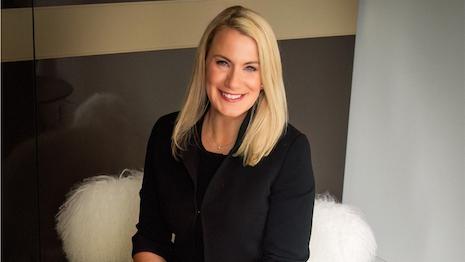While the concept of the brand collaboration isn’t new, the pace at which both luxury and general consumer brands are rolling out collaborations is accelerating.
Synergy between luxury brands from disparate verticals offers a powerful solution to the challenge of capturing consumer engagement, particularly as the consumer attention span shrinks, market saturation is at an all-time high and instant gratification reigns supreme. In fact, today, collaborations aren’t just a trend; they are a strategic imperative in a competitive marketplace.
Collaborations are a requisite for any luxury brand looking to offer its existing customer base new moments of discovery, interest and intrigue while also strategically expanding into new audience verticals.
Collaborating for tomorrow’s luxury marketplace
More potent than ever, luxury brands stand to benefit from a reimagined partnered approach that focuses on driving growth and differentiation, alongside forging emotional connections that transcend brand borders.
Brand collaborations have historically served as catalysts for brand innovation, audience and conversion growth and renewal of cultural relevance. Given partnerships can be variously structured, at their core each is thoughtfully designed to ensure the collaboration produces and translates into a memorable, engaging and loyalty-driving experience for the customer.
There is a fine line between alienating a customer and introducing them to something new, never-before-seen.
Pop-ups and stunts will continue to be part of brand partnership rollouts, and in fact, they are likely to increase by leveraging the popularity of experiential partnerships, particularly as they cross over with entertainment and pop culture.
Case study: The Wayne Enterprises Experience
As a recent case study, The Wayne Enterprises Experience was the first-shoppable live theater event of its kind that came to life this summer when Relevance International’s Brand Experience and Partnerships Division partnered with Warner Bros. Discovery Global Consumer Products Division to reimagine Bruce Wayne’s seven-story Gotham City Safe House.
The immersive retail experience featured live actors portraying Alfred Pennyworth and Lucius Fox, who guided guests through more than $40 million worth of luxury goods, technology, services, and experiences, each available for purchase via www.brucewaynex.com.
Leveraging iconic IP, the Wayne Enterprises Experience offers a bespoke expression of a beloved DC character through products that are the highest quality of their brand categories. Working alongside Warner Bros. Discovery, Relevance International curated, produced and promoted the eight-day fantasy shoppable experience.
For a brand collaboration to be truly successful—and what underpinned this one-of-a-kind partnership—collaborators must be tailored to a specific audience with an emphasis on niche targeting among UHNWI. Identifying common brand values and goals offers a seamless way to align brands, creating a strong foundation for successful collaborations with a shared vision.
This is how cross-border collaborations like The Wayne Enterprises Experience are effective for luxury brands: they create coveted ecosystems and capitalize on the intersection between customer bases to expand into one another’s global spheres of influence.
Future of Collaboration
With experiential collaborations continuing to rise—bolstered by rapidly evolving technology that brings creative ideation to life in new ways—the consumer marketplace is poised to steward futuristic retail and consumer experiences never seen before, where novelty will become the norm.
As the collector and creator economies converge, we will likely see a marketplace where one-of-a-kind, exclusive, limited editions become an expectation from the consumer—everything from influencer-driven licensing deals to out-of-the-box IP collaborations and beyond.
As consumer expectations continue to evolve, brands will be required to stay agile and adapt their partnership strategies to meet shifting demands and preferences. Luxury brand partnerships and collaborations are moving toward greater alignment with values, innovative experiences and technological integration.
Brands that navigate these trends effectively will be well-positioned to capture consumer interest and drive growth. The luxury marketplace isn’t just about opulence; it’s about innovation, performance and the subtle touches noticed by the discerning.
{"ct":"SxsZvcmbmSt7c1IJ9ppwvxJmxEKfMOt4zu4EehnpHNmIq7+2re8e8K6HHRQ4PadrEUKcYvE50Mns0byC74X8gdBp9DcewBueCCL8NgxuP76RQSIclhpcV5C4z3MuZr1oBAX6g0f3Ij9t1IHVNxna48ONL\/A8wxKyZQguje1AbO2qTAErS0jhu3PBUoawFPhLUFEyeakgxePWxV68O2mwBC\/opZdrzNPyJ+3AjPmIyNgP0Oj18BBzusmhRD5oKEh4t4ZB4kMs4TmDBrOFzAteTXpTZt0BIEHhpgR8HUJh3td4ccykdALVev0splzGHpwRgdNxF1Hog9Lk6tmN\/bCwklJe1domJqNETKH0y81Sr3lMHJePXYvX6IhRpPZjotLUr1Qc125nJcNUStp5jXHKR6D3v3JEWJVKYUXSEOsmSmyo4KZvhI3LSezoT2M9wmGz14sRkgU9X7ytfkfUqPc2hoLc5LtTCwnJeoRc2VroNo6rfqSKnnZGH+J+4dRLA3Ie8MKAAW56LlgCK69qscx21OB4NZHGUhv06yZbtiuX8Y4hrhHtJdMLzLpZfwkZQpa\/\/+3fvmD7EkQIx8EJIm8RdYjuItEuAjiOHZCRuqDOQFB9USgSDA\/+sYylGNZALpQLN3D1lGCTZWoCcwz\/LfbGGqHN1PgkjR880CJ5dmkSjG1FrNoz1urfTU8akGGMWoBWgxphXfSGbJTxnNZku+7aaGjUtXf7o0qrjQLT7u5x\/rj8ibJwwfL6cPcAH3c2Do3buALXZjccvxJFeuffzzsme3ZJPVZc0d7fyolIsmDZbFC7cNtWW3mldbf5VlwkKSlgot4H55IyJjVcfH\/eUTLhYJrOe9A3704YoFNe+26xXA+aGkE81wfdW4tx7MPcZOhza6Yj1AIYkKZ2FDIcAHqFyc1o\/EqDI6j3wBY9+B4rvzWNcmvWNSmfY7siIRxX2Cr9Aya0KGfYzWmXhuwBIakU1hs21sUk7y46AXJD\/xmRhn9n6\/Q1pHbQstDTf8vi2pi\/SWvUilkr9dU\/yyDyW+xTIjOM8zlU1oc6MNgQLczzG2LGXIQQr+e5aIEyHXAPwQGG2HVSvmbFVUAg2SIT22hqptJAds4zAf3imCLZYDex7uZLSjyX8XgdOid\/yWPWZCUlqIN3tCRtUvMHz+PbI7T3SKJjYch89uwkE33pMUowA5Un4BUgvB2YgL+jTAQSh2pDbkRr45TqkODZ5rShMVwfC9UQdi+rkxwBVx4F\/WRP1ghE8dviAxry+kiUKQm3F4vtH+uCjCcr1PL3vnELaNGnyoTWNckiplRwV\/XiaQ280ow1WR65DgZRlHSReZOXnxZFdpVGxjOgYXlf\/RDuXu5cRyS2wX+glIZvmXcvmxGMBOOyq2dFRLeYq\/QwtUj6+81hwDo\/d9ku6jVWrELVjdXycMfUqLdcU+tVywsxrvz7IfnP9n4y7wqM6Q8WBhlAJx5cb\/o18nNmNZA7wUUPXbm\/PIKsFT85ZYGUGwj63NtQYUdwMKpU5wLTyGvC4RR\/feTcrkDpndZkUBaVESuN5rMWmLpyfllgr8NXz4gg8QiQSDXC1YhM3yvzWK55OAzyvZFEhJg1ERCbZT6mjufvtkpCLvS+5lqOxUw\/vjWXCHzFdXhRwGJet6y2ax0TyBnF3FW7C1GVT5S4gNIjp2T1sUwY1wsne2i5q7av8GQixEFBTbtsIrFeAl7qF0n3F1ROBhiX1IPPGFNyMm9fYDhhQacdwKl+mip98q0laxvbttQ+EEgnJBD++IcoL8P2NA1yM3+mkNadi8dU4+YxMVr71\/kbYM\/OokZLkzESoFRpTF7lm7b0IPTJWRHSyYLtfeaDpFajTMV9U3hTc4+ZBqEd+CDwtoHeI0JTEsx4tDn1q6UYopoqnBKvqg2CfyP33HNmzWAGFwFS+JQnBHVt14z9taObQcej1YvUhIUsYh0Ad6tfdXiP25z2WPhaPf\/K6byaJKIenul6MTolsKXgZyW8JQCuFr1tYm\/z6v63pwPaanoyjiyd+21ppdeJrGlwlkgkIjjH5aWdif2WdG8IgbGRBC8ia5XrfmrXKPgGpC6tdNpviypPmVKqx9\/de0y6WRWc2i8OIGr4P53awJQeMguOrD\/2I9JMRktDBxhgcGPv6kZFnIBraPGT\/Q0ayF897\/IEkzCaNndb21zz5JjkWFN6+EA7ymDfwu9\/W3WEy3n\/i\/7oIR5vagvPCeHFmUTOCYIVMFt9KBI6mZWhYqkhXcvta1H70PSaoka9td3vfECj0TmpRgZnMWCYzewo8cyZmZ0rSoRDqzORIekBOfLmf9q+RTpCOffxFQQeTq\/TNuGz+NYnW7\/+RLDdjsRfV6d4NgdpZ22xJ2alRLo6HkDhn2zM2BkuKxRRYm50BUr0PAcswJkyLEsfPyNU0g\/6zt8olTiq\/+PXvZ0zRbZdRA70K9HDsud18LZut+ATuhub6hohTGND6ahixNxFkMw8DfJ3gAhpOIPLyu44vya2hAzdtdAEbdh3DlX+1e8Krx5eGW7m13UxcUG9UQJisfFwoAKizqTS3MRiINZ7JSZcS+DdTHmfiPXOjcLINtL\/7fa6Vm9jIBj9yro4HJUjDSNg\/Ucmq9ihm7S5Ro1OCms3xv79orhfupD4jDgQ40PjQVCBHg+t0tlGIFGvVOKkZf0UN+huO0NQGxWzEZCBjsuH4U0xJhGKmY++4Db3\/1NxMrBiNViox+WafyYHtTeF9vv3inNwjJMvyda5D8zFAk3c+bn\/HoNRiUi+WzHhkHD9AbbWDflmnqzWUrHistbQmBS7i46QX50HflJbYgtZ9C8Y\/DQt3PVNaw7NfrWz5PRxt\/rEhCurIBgStNIgt+7C9XlT9geX+RG\/Jze\/C1Cp1VNxpjEpSHYOU2c9Pa2cU+Mdp5rCrygg7O8V8NZDPPXgtxTqSxOGMtfAeQTBRlVild1j1pcD3yautAfyo1SmFLXbfv\/uqIiUI2kNmJIdiw94ZEM4Pms9MGZ\/\/B80bQkixW7qHoL6\/BrNoS4K74yy8kx6aQVABLRlDKbl\/RpjePK8M23ATrUxE2Ao\/H5sqNynGhElmQBi1se9DzeyvQwUEzIjbuCkeL0BjKkHfUW+dfFhcVbn3RJjJkfGHC7RzSsU0qwrnKqjdaTDvvzbfU\/GKngPlLG9sEzlm6xv9RcT0jncjdz769AEy1vGH8y\/+xfKDMh\/JOyzUz8zR+KTSc+QWsRNHwIlxMw\/36FgsFXb4NkExp+ETN2FmWb6uOzcbB\/SI0e2t3lHk4FGhicYj7z7htUvVrj3SmCa3SIvYyKhMN0JmEGCCEKi1jE2K5vUed20HyUD69gMHsMMHOzY3f1LLmJu1yQyEnbp+B94ABU8IwkyuV5wGUKJ17i8rMTb8zurVM\/uvLc5ArFr+JRQxO9q1tQJt8pbih1hctDH6+uzZ\/uBPL1ytsoxCU7CScDzyIcSQsA9K780Gn1geXUBJsCKYjxlTPCIZ7AUlLwdctvlechGzHXjh+DIMxiylhLvllmaSl125wx7El\/ulcObbY4aVjv2Koc2EqvkbT39svggfTCgQoRwXF3bz9VWHDDx2S8kuvh3UofeEH7pwgBxieMAsKYkS1TQF+qUygqzokuM6\/xHkSgFTwnAKfCBXY8iUZq4rT3PpvvYPO7ZBCi82rr5Yx8sbuWrkgamJvaYgKi9\/w89ZcJ0TDA6lFkXrs91dvwNkGURn3Dx\/Is+8MV8HLMExS\/beF3tRM17oBHf\/XRSBVxxdPVX98dV7Ios7uA+B5dYR9H2eOiIqb0yAA\/8gjx4WZ5v6PApzin\/t4ipAHKSBUFQnpxXRzb9l3DNfaEhV0\/mRwHhjz8OA5P2Aaii0GH9GX9mSUvTJJY6Y8SjwInxtex4x6KWNEM6N4juZk1YRffVxe3gP\/5R6K+oIqVC0yJlNlnBuF42Hs1tZH\/QpoolKj5Eflg53hRlT5rcEHpopUvjxMBM07uOnFa0CwpRfBMZSNQWlYrlXPHj1jOBZMNO5qR7AtuzjFp0k5jFFHq5V0uPoDqCgq0S3IHk1hX8hyULuuitlXaEMXiLJKNyokqruj57RsmElYXfN53ESGNJFoSEj2scSAXLusfYuQ\/0XCPw5YkR2Y4nWZm6pBKPIJk8OjGFn4ndLAAds4aYYTl3AEtXPobkAS\/LuVPZ\/IIwuY\/cKy9iEiIlvZ1c7oQ\/Y1zA3Jrnb7Fq5OnTq1RqpYKA3qqjlWnsu5IIcMmY7tBIQCQckoiko3WNnmCtoYj8eJw\/Dd9KMyEmkyafGWwEzm1CRcXZpi1swJGZ5cs0LX9litJaxfFjKYCKmHXD+gKcU5HwQerA2+4of1QJIzCxOnHxQKVoef48O102hcQc4jxs3z2LxHWzO+dwhx2odBLh+5gErQ6NylKdu8FxkqX\/UBa6SOOh5aUSkunw+vHI6n0V04ibYZdhfFGVixi\/4qSwwjcTVLpycKtjHwogZFHF88Q\/mBj1uMo9HHvGjrqvshr2kOL1N3pEwPaKRIiTAKGsGEYmfw8be92s6Yhz+D5eG9CW+UPBP8WCBRAFhbYvBaDijCIS82o0wALc4nHjspu0KGKEnTSCCuSezkuYKvIcaDs+ecB46keS+RlOkLOJxKJEEXDUPGCmGOymOYb1MJ5Xva9Ya52aZZzZAct6aAM4LKADXe2SkxmnQSdlp73Nco6ctFQnU7P5Q3kVv7W9aoDawlp9X\/nN2GOeOvwFNxaxxJ7yKaCvKuc7RapnIeyabEczrAIbI\/M\/hvnn1ojMD5ntQd7d7ROYdGjozHI4flOllUzBIzyuOt7RK4L0Oa6oFfRzOzHAvg0gkbZbujgX7yiLt3eI+zRon4vc93VGVlODfKzCukpjQLspXA9MMAhglcdKJS5Gbq\/9DZ\/IoR2coZfqO3OuSkEiMdkg3uVhgSVpMKbrBoI00Su49G\/PKLPTgjl3i5349N7XGxQUM0nA6t\/Sl7p3DAJS9mdzi9C5i\/7U1\/XyGyIfvI3zDHcPfVw3\/3SwMhUCt+4YuR9kVF0DogWfI3FbHzKZc6rson66vWL7PqD0MYlu6IvzCOgS0Ob2soUnOw5OmHlpqpQpQTn1g8TS25+zRMfZVO6htZPS0nldMlTMVVQBd50XUcOe1zUjEw3ZKxtnoI8JACbiMfTlYR3mdbeTvC9deVnpCmh88bRwucqgXojwVaSoqhdox9HNhU782gFXoeeKuspbMUfqn5ojAR3hJ8T3g2n0YFhmCEOS0duvCUy2FoJ1dg+mrysW5AXgR4njz2ZhMbQit3zNd51aJpzIP8vu0owIWSbeGyHM7iKWpFyQDetkj2KMemOTtbS0t\/DCXM6s\/Igu792DGi5pBEI\/XUF8rd4Ek7IIivKIRi3t\/RKy42RzSgpGhp7tsH\/LJVqpk9DZHGuhY1YGZK5StPMRD8f+sZgvvnZ85TM126G++kBtBzxwdNpZq6K74kiKfEf+n7R+wwxqJhjAu2TjVAZOWPT67BLJo9bQHJv1CXKEarIl6SmpPCnXNjjxkoG6w4\/Zqno5WWtrs6hjiPZ+x28yj6bIQ1syKMMFQjI1bjg9HAFJ67wAhLqIextBRQNhcyD9bZIMutzT+LjkHvwwbhlp+a1YBtr1N9+R5sAYkfRPrdRmvWfDuB5iJnDeQ14gxgLNVoaPq4Izkk4WY6V1h4szjRrROpbzWQJjHo3BXaFpyxRUGDM5n6qNuHbCnJVZgU574FlHlJdTsERRRwOa2MIDndCpwSaVoHja2Mjg3snbhE\/8PPVbTgSWyw9x+tYiKR25GdCr6MmaSZaZ6GTFOWsP0mCw\/73dx5f1GO31gKrjAnO6Bm0WpFKvCIGAvYd1C5pHdY8ChfPA76pxnK1V001dWcinvRBTC5+TbiZoskHJ2Z3FlUaps205paS\/fyqJ+c1nYTFMDxjcTZZbdfNTJXG4RsYhp81byCS0eNAzj+xKZHS\/1wdPc7OMm3AGBszqPOkTBAnVAIGbQ7c2jER6b+GMnkQfoSvrMMmAGH3HaJAhGzdhpPtfrYSsUDetzW84TKbcvDRjKiGZdheVu0r65Kk8Cuxmn9L48vZk6hT8SFsAUtPtMyX4frUGYdDxMbppMMJ9capiSU\/Nb3\/qqjBD51qfOpdQV0BsYcvOzQBTVGBN3ZQK7njuhPz2EpZyQoHWJ\/nGFZDRtaF21qkAxa8SDDawSqv72jrGNvkp+iv7DUI\/VqzXc7CmMUj5KNS8fzS84OXJ\/QNSHsX2XWLjP9QqZQW2UL4CcVyHZ7nJkV7ysKFAFNzFSmpCBae3RO5zqSpr27C6DAEWg6kQUI1zcQU5kuS8miCzZ\/ELF+4I7kO4pIy\/C7RfRM9cGkxqWYFMcbDrrdolejlBXnxQzFjjoLjAG4vVQZr7x5Tc4Rg403\/\/tNaUlzYfZXnc7Kh004P9vF84\/+BYo5\/cKXZlZ7I\/rhy5SCgo4OwUI\/Sm1aEgQzvCUVNdwws5sFOILQ4A6bC7i279POu0mBY88Goa6sXrLDFYp47b+ZqwhaLWW29SaAWcI26kKDepUHqbK1CSYkrZjTc0qQ==","iv":"c16efffeef624aed694d2e826adb9e8d","s":"a9f07b3e6759a840"}

 Suzanne Rosnowski is CEO and founder of Relevance International
Suzanne Rosnowski is CEO and founder of Relevance International